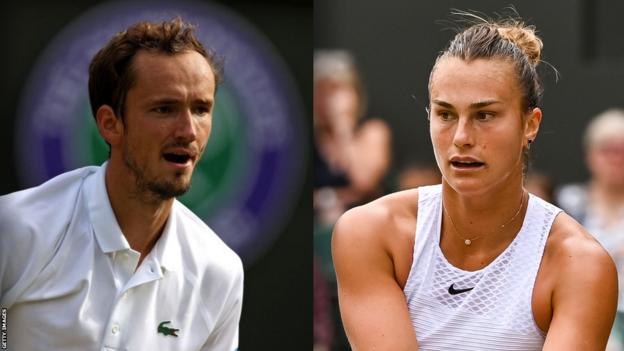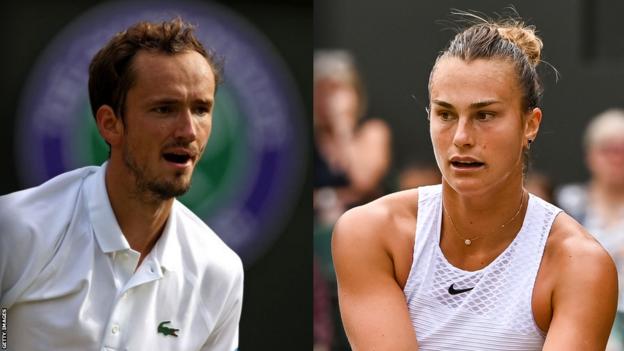Wimbledon 2023: Russian & Belarusian players can compete as ban lifted
Russian and Belarusian players will be able to compete at Wimbledon this year as the All England Club lifts the ban…


Russian and Belarusian players will be able to compete at Wimbledon this summer after the All England Club lifted the ban it imposed last year.
The players be able to feature this year “subject to competing as neutral athletes” and complying with certain conditions.
They were banned in response to Russia’s invasion of Ukraine and the support provided by Belarus.
Wimbledon starts this year on 3 July at the All England Club (AELTC).
“We continue to condemn totally Russia’s illegal invasion and our wholehearted support remains with the people of Ukraine,” said AELTC chairman Ian Hewitt.
“This was an incredibly difficult decision, not taken lightly or without a great deal of consideration for those who will be impacted.”
The decision also covers other British events held in the run up to Wimbledon, most notably the tournaments at Queen’s and Eastbourne.
Conditions players must comply with include:
- Agreeing not to support the Russian and/or Belarusian states or their regimes and leaders
- Not receiving funding from Russian and/or Belarusian states, including sponsorship from companies operated or controlled by them
Outside of Wimbledon and other British events, players have been able to compete on the game’s professional tours as neutrals – including in the other Grand Slams – whereas Wimbledon and the Lawn Tennis Association (LTA) were fined for the bans imposed last year.
The AELTC said its decision for the 2023 championship was made after discussion with the UK government, the LTA and international stakeholders.
The AELTC and LTA said they stand by last year’s position but that without changing their stance this year, the tennis’ two main professional tours, the men’s ATP and women’s WTA would have cancelled the LTA’s membership.
As a result, Queen’s, Eastbourne and other British grass-court events would not have been staged, damaging British tennis organisations financially.
Russian trio Daniil Medvedev, Andrey Rublev and Daria Kasatkina – who are all in the top 10 of the men’s and women’s rankings – are among the high-profile names able to play this summer.
Belarusian women’s world number two Aryna Sabalenka, who won the Australian Open earlier this year, will also now likely feature.
Players and their support staff will have to sign neutrality declarations in order to compete.
Punishments for breaking the declarations will range from fines to expulsion from the tournament.
What has changed since last year?
Many sports banned Russian and Belarusian teams and athletes in response to the invasion but the ATP and WTA decided players could compete under a neutral flag.
Last month, Ukraine’s highest-profile player Elina Svitolina told BBC Sport that Russian and Belarusian athletes must remain excluded from Wimbledon while “innocent Ukrainians are still being killed”.
Wimbledon’s decision last year was guided by the UK government and supported by 69% of the British public, according to a You Gov poll.
As well as being fined, the WTA and ATP said they would cancel the LTA’s membership if it exercised further “discrimination based on nationality”.
That led to the LTA fearing the tournaments traditionally staged in the lead-up to Wimbledon may be lost forever.
The LTA was fined $750,000 (£608,355) by the WTA and $1m (£811,140) by the ATP for excluding players from the tour events they operate in 2022.
“There is no doubt the affect of the LTA losing membership to the tours would have been very damaging and far reaching,” LTA chief Scott Lloyd said.
A LTA statement added: “The impact would be felt by the millions of fans that follow the sport, the grassroots of the game, including coaches and venues which rely on the events for visibility and to bring new players into the game, and of course professional British players.
“Given this, and our responsibility as the national governing body of tennis in Britain, we have worked closely with the UK government, ATP, WTA and ITF, alongside the All England Club, to find a solution for 2023.”
The AELTC added: “Tennis events outside of the UK have experienced a year of competition with players from Russia and Belarus competing as ‘neutral’ athletes.
“We also consider alignment between the Grand Slams to be increasingly important in the current tennis environment.”
UK Culture Secretary Lucy Frazer criticised the decision to fine the LTA for its stance last year while agreeing with the AELTC’s lifting of the ban for 2023.
“Throughout Putin’s ongoing war in Ukraine, we have been clear that Russian and Belarusian athletes representing their country should not be permitted in domestic and international sporting competitions. That position still stands,” she said.
“Individual, self-funded Russian and Belarusian athletes can compete in the UK, subject to following our guidance on neutrality. We therefore support the approach of the All England Lawn Tennis Club and Lawn Tennis Association on the basis of following that guidance.
“The AELTC and LTA should never have been fined by the international tennis tours for taking a principled stand against Russian aggression.”






